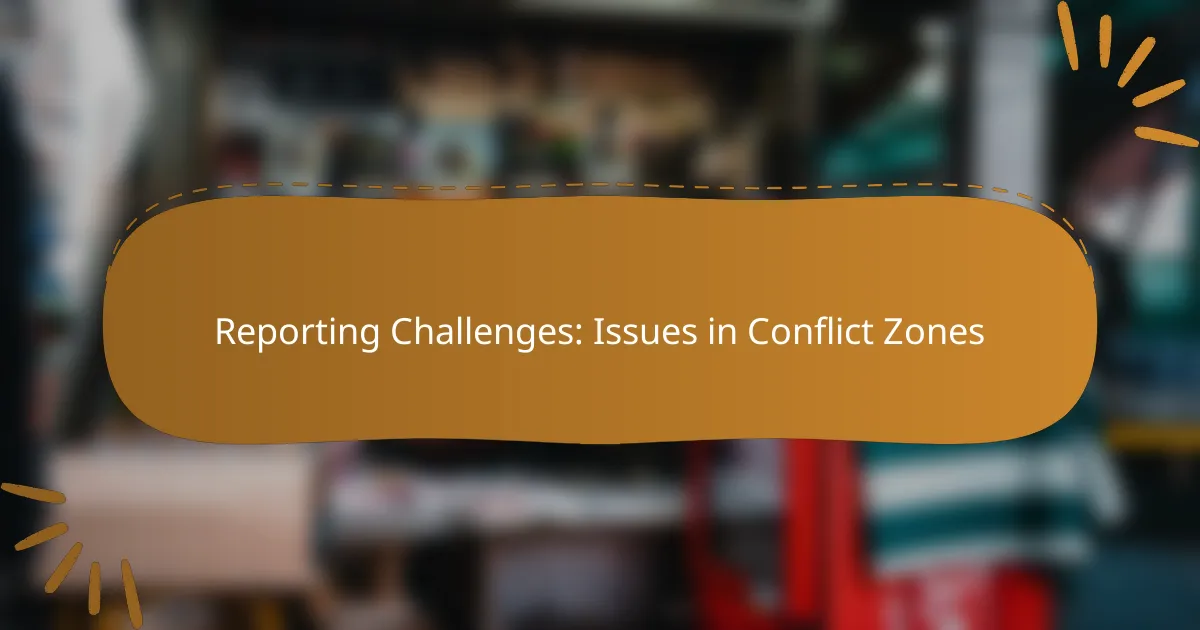Reporting in conflict zones presents numerous challenges, including journalist safety, access to reliable information, and ethical dilemmas. These obstacles can hinder accurate and effective reporting, making it essential for journalists to adopt protective measures and utilize advanced technologies. By navigating these complexities, reporters can enhance their ability to deliver critical information from volatile environments.
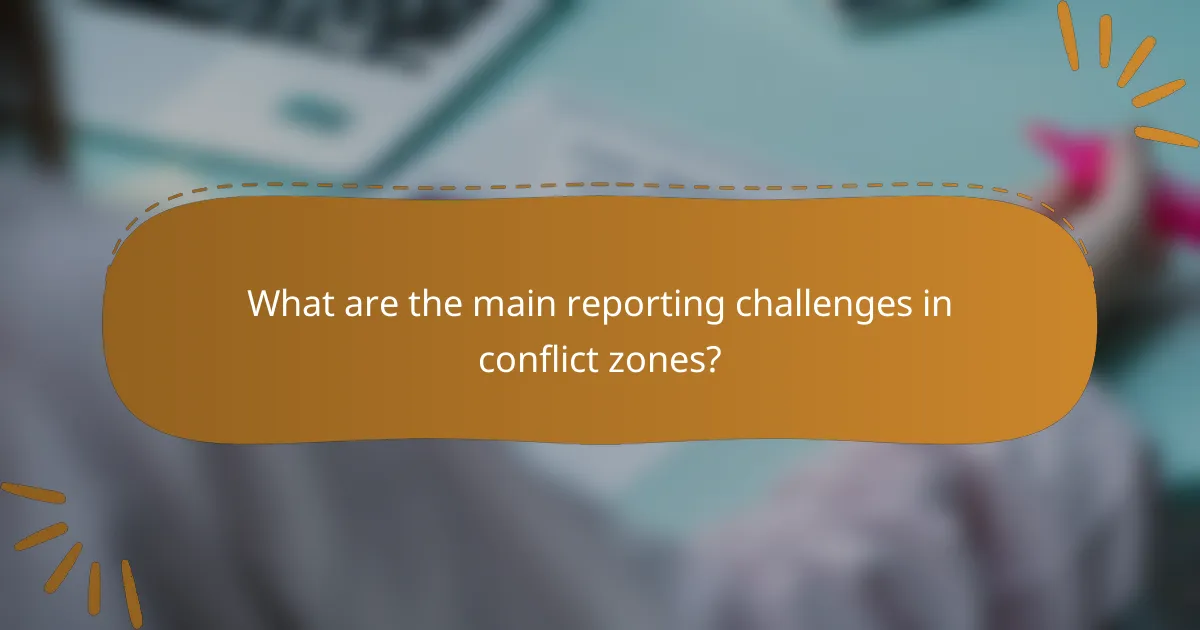
What are the main reporting challenges in conflict zones?
The main reporting challenges in conflict zones include ensuring the safety of journalists, gaining access to reliable information, overcoming communication barriers, navigating ethical dilemmas, and dealing with resource limitations. Each of these factors significantly impacts the ability to report accurately and effectively in volatile environments.
Safety of journalists
Safety is a paramount concern for journalists operating in conflict zones. They face threats from armed groups, government forces, and even local populations, which can lead to violence or abduction. Adopting safety protocols, such as risk assessments and secure communication methods, is essential for minimizing dangers.
Journalists should consider joining safety training programs and collaborating with organizations that specialize in protecting media personnel. Awareness of local laws and customs can also help mitigate risks.
Access to information
Access to reliable information is often severely restricted in conflict zones due to censorship, propaganda, and the chaotic nature of warfare. Journalists must navigate these obstacles to gather accurate data, often relying on local sources, NGOs, or international organizations.
Utilizing technology, such as encrypted messaging apps, can facilitate communication with sources while maintaining confidentiality. Building trust with local informants is crucial for obtaining valuable insights and firsthand accounts.
Communication barriers
Communication barriers can arise from language differences, technological limitations, and disrupted infrastructure. Journalists may encounter difficulties in understanding local dialects or accessing stable internet connections, which can hinder reporting efforts.
Employing local translators and using portable communication devices can enhance information exchange. Journalists should also be prepared for potential delays in communication due to unreliable networks or power outages.
Ethical dilemmas
Ethical dilemmas frequently arise in conflict reporting, particularly regarding the portrayal of violence and suffering. Journalists must balance the need for accurate reporting with sensitivity to the victims and their families.
Establishing clear ethical guidelines and seeking input from local communities can help navigate these challenges. Journalists should prioritize the dignity and privacy of individuals affected by conflict in their reporting.
Resource limitations
Resource limitations, including financial constraints and lack of equipment, can significantly hinder reporting efforts in conflict zones. Journalists may struggle to obtain necessary tools such as cameras, protective gear, or reliable transportation.
Collaborating with media organizations or NGOs can provide access to resources and funding. Journalists should also consider using low-cost technology and innovative storytelling methods to effectively convey their reports despite limited resources.
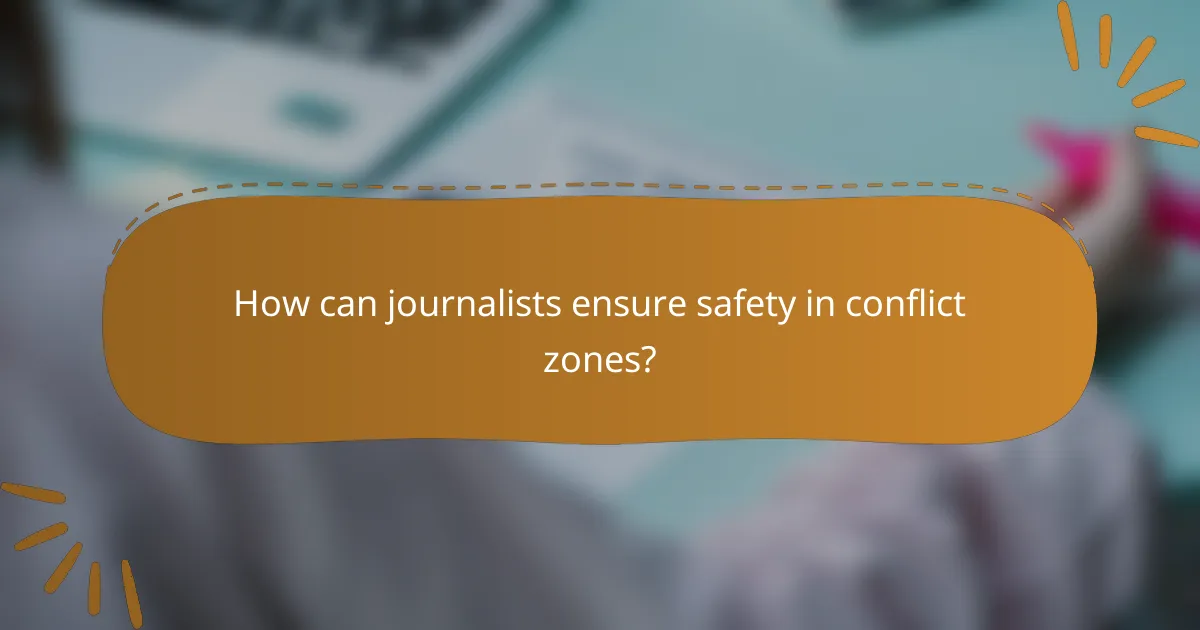
How can journalists ensure safety in conflict zones?
Journalists can ensure safety in conflict zones by adopting a combination of protective measures, training, and secure communication practices. These strategies help mitigate risks and enhance the ability to report effectively while prioritizing personal safety.
Use of protective gear
Wearing appropriate protective gear is crucial for journalists in conflict zones. This includes items such as bulletproof vests, helmets, and other personal protective equipment (PPE) designed to shield against various threats. Journalists should select gear that meets international safety standards and is suitable for the specific risks of the area they are covering.
Additionally, it is important to regularly inspect and maintain protective equipment to ensure it remains functional. Journalists should also consider the weight and mobility of the gear, as excessive bulk can hinder movement in dynamic environments.
Risk assessment training
Risk assessment training equips journalists with the skills to identify potential dangers and make informed decisions in conflict zones. This training typically covers situational awareness, threat analysis, and emergency response strategies. Journalists should seek out reputable organizations that offer specialized courses tailored to reporting in high-risk areas.
Regularly updating risk assessment skills is essential, as conflict situations can evolve rapidly. Journalists should practice scenario-based training to enhance their ability to respond effectively to unexpected challenges.
Establishing secure communication
Establishing secure communication channels is vital for journalists operating in conflict zones. This involves using encrypted messaging apps and secure satellite phones to maintain contact with newsrooms and colleagues. Journalists should familiarize themselves with the latest technology and best practices for secure communication.
Moreover, having a clear communication plan that includes check-in protocols can help ensure safety. Journalists should inform trusted contacts of their whereabouts and establish regular updates, especially in volatile situations.
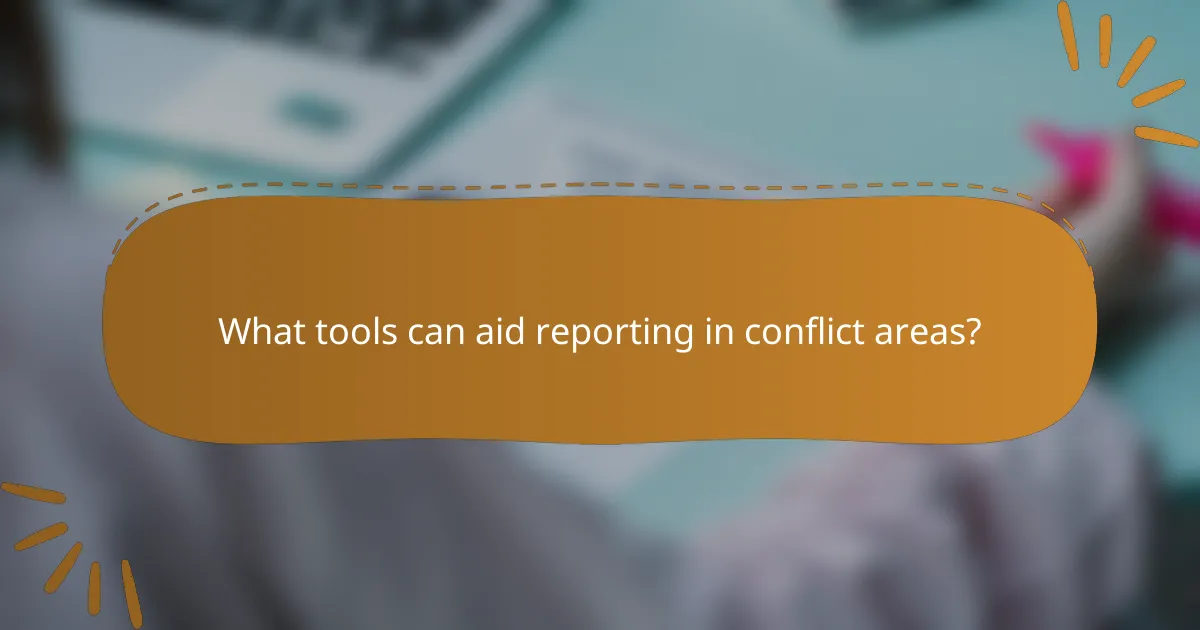
What tools can aid reporting in conflict areas?
Various tools can significantly enhance reporting in conflict zones by ensuring communication, safety, and effective data collection. Key technologies include satellite phones, encrypted messaging apps, and drone technology, each serving unique purposes in challenging environments.
Satellite phones
Satellite phones are essential for maintaining communication in areas where traditional cellular networks are unreliable or nonexistent. They operate via satellites orbiting the Earth, providing coverage even in remote locations.
When choosing a satellite phone, consider factors like battery life, weight, and cost of calls, which can vary widely. Some popular models include Iridium and Inmarsat, both known for their reliability in crisis situations.
Encrypted messaging apps
Encrypted messaging apps are crucial for secure communication among journalists and their sources in conflict zones. These apps use encryption to protect messages from interception, ensuring confidentiality and safety.
Popular options include Signal and WhatsApp, both offering end-to-end encryption. However, users should remain aware of potential vulnerabilities and ensure they are using the latest versions to mitigate risks.
Drone technology
Drone technology has transformed the way reporters gather information in conflict areas by providing aerial views and real-time data. Drones can capture images, videos, and even thermal data, offering insights that ground-level reporting may miss.
When using drones, consider local regulations regarding airspace and privacy. Additionally, ensure that the drone is equipped with high-quality cameras and has a reliable battery life to maximize its effectiveness in the field.
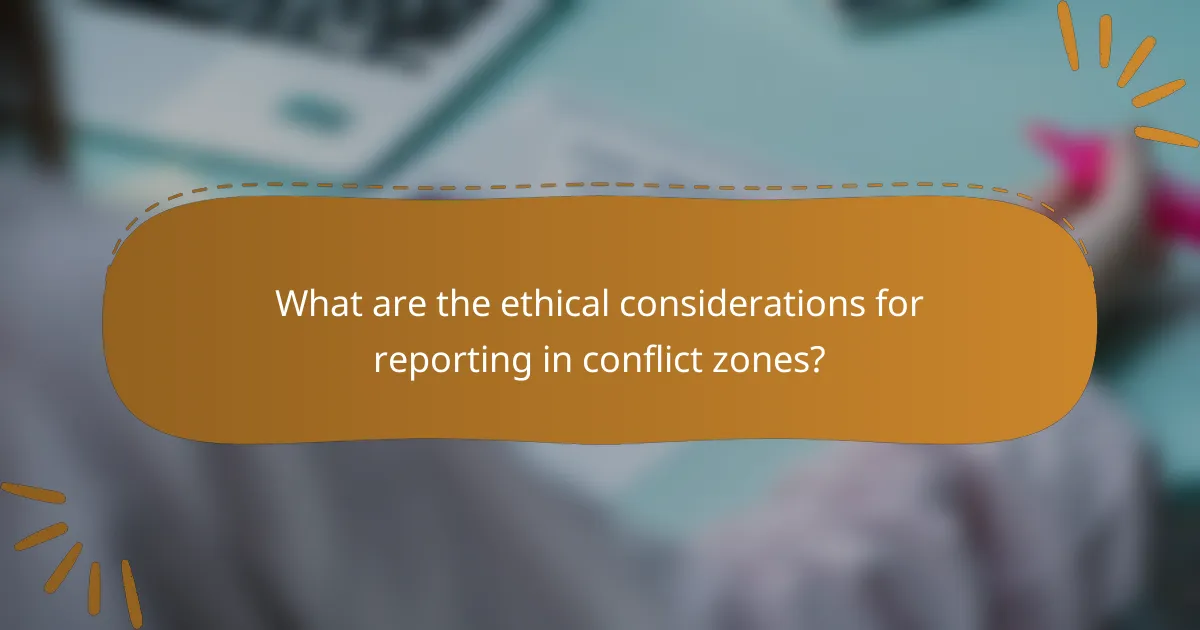
What are the ethical considerations for reporting in conflict zones?
Ethical considerations in conflict zone reporting focus on protecting individuals and communities while ensuring accurate information dissemination. Journalists must navigate the delicate balance between the public’s right to know and the potential harm their reporting may cause to vulnerable populations.
Minimizing harm to civilians
Minimizing harm to civilians involves assessing the impact of reporting on local populations. Journalists should avoid revealing sensitive information that could endanger individuals, such as the identities of informants or the locations of safe havens.
Additionally, employing discretion in imagery and language can prevent inciting violence or panic. For instance, using general terms instead of specific locations can help protect civilians during ongoing conflicts.
Informed consent
Informed consent is crucial when engaging with individuals in conflict zones. Journalists must ensure that those they interview understand the potential consequences of sharing their stories, including how the information may be used and disseminated.
Obtaining consent can be challenging in high-stress environments, so it is essential to communicate clearly and respectfully. When possible, providing context about the reporting process can help individuals make informed decisions about their participation.
Fact-checking and verification
Fact-checking and verification are vital to maintaining credibility in conflict reporting. Journalists should corroborate information from multiple sources to ensure accuracy, especially when dealing with rapidly changing situations.
Utilizing established networks and local contacts can aid in verifying claims. Additionally, employing tools for cross-referencing data and images can help prevent the spread of misinformation, which can exacerbate tensions in conflict zones.
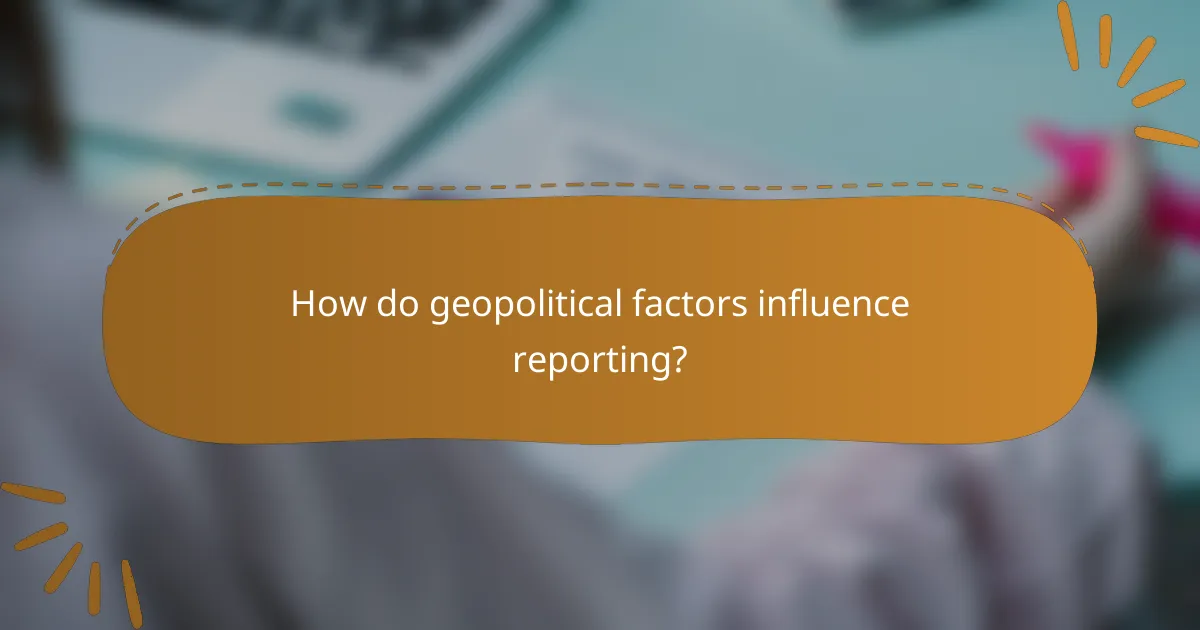
How do geopolitical factors influence reporting?
Geopolitical factors significantly shape the landscape of reporting, affecting what information is available and how it is disseminated. Journalists must navigate complex political environments, where government policies, international relations, and local power structures can either facilitate or hinder their work.
Government censorship
Government censorship is a major barrier to accurate reporting in conflict zones. Authorities may restrict access to information or impose penalties on journalists who report on sensitive topics, such as military operations or human rights abuses. In some countries, this can lead to self-censorship, where reporters avoid certain subjects to evade repercussions.
For example, in regions with strict media laws, journalists might face fines or imprisonment for publishing content deemed unfavorable by the government. Understanding the local legal framework is crucial for reporters to navigate these challenges effectively.
International relations
International relations play a critical role in shaping the reporting environment in conflict zones. The stance of foreign governments can influence the safety and freedom of journalists, as well as the flow of information. For instance, countries with strong diplomatic ties may provide support for local media, while those with strained relations might impose restrictions.
Additionally, international organizations often intervene in conflict zones, offering protection and resources to journalists. However, their presence can also complicate reporting, as journalists must balance the expectations of these organizations with the realities on the ground.
Local power dynamics
Local power dynamics significantly impact reporting in conflict zones, as various factions may control information and access. Different groups, such as militias or political parties, can impose their own narratives, making it difficult for journalists to present a balanced view. Understanding these dynamics is essential for accurate reporting.
Reporters should build relationships with local sources to gain insights into the prevailing power structures. This can help them navigate potential biases and uncover hidden stories, ensuring a more comprehensive understanding of the situation.
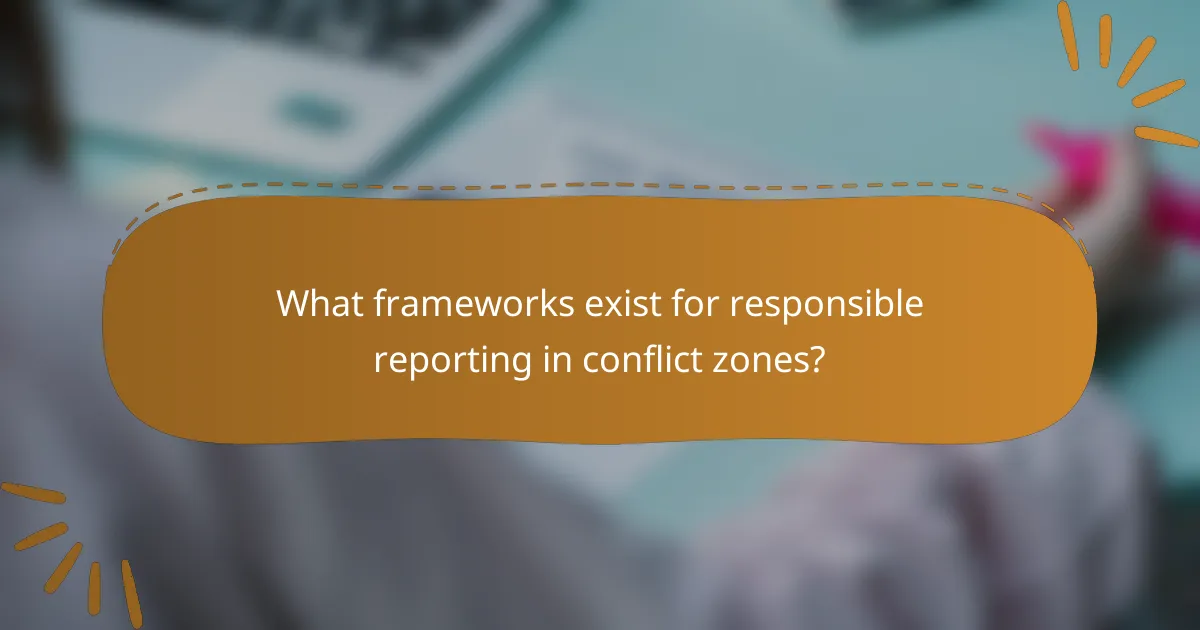
What frameworks exist for responsible reporting in conflict zones?
Responsible reporting in conflict zones is guided by various frameworks that prioritize ethical standards and the safety of journalists and affected populations. These frameworks include established codes of conduct, legal regulations, and best practices that help navigate the complexities of reporting in volatile environments.
Journalistic codes of conduct
Journalistic codes of conduct serve as essential guidelines for reporters operating in conflict zones. These codes emphasize accuracy, fairness, and the need to minimize harm to individuals and communities affected by violence. Key principles often include verifying information before publication and respecting the dignity of all subjects.
Specific codes, such as the Society of Professional Journalists’ Code of Ethics, outline the importance of avoiding sensationalism and providing context to the reported events. Journalists should also be aware of local customs and sensitivities to ensure respectful and responsible coverage.
Common pitfalls include failing to verify sources or relying on hearsay, which can lead to misinformation. Journalists should prioritize transparency about their sources and methods to maintain credibility and trust with their audience.
